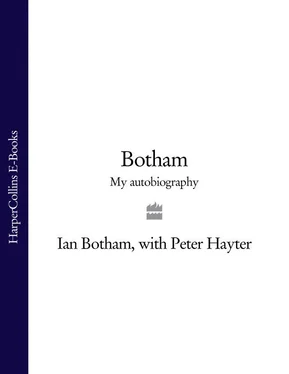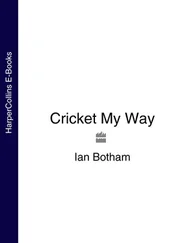I had always intended that the summer of 1993 would be my last as a professional cricketer, but I had been determined to go out at the top. So when I said in April that I was aiming to win back my place in the England side and play in the Ashes series against the Australians, it was not just the normal pre-season optimism: I meant it. I was convinced I had plenty to offer, especially after suffering with everyone else the woeful excuse for a performance that England had served up on the winter tour to India and Sri Lanka, as a result of which they had not only been beaten in all four Tests but thoroughly thrashed and totally humiliated.
Frankly, I had been disgusted by what had gone on out there. Graham Gooch played the best cricket of his career when leading from the front as captain, during which period he passed David Gower’s record as England’s highest run scorer in Test cricket. I have nothing but admiration for the way he made up his mind to play at the highest level for as long as possible and kept himself fit enough to do so. But I have always found that as England captain what he couldn’t come to terms with was that the right way for him was not necessarily the best way for everyone.
When it came to the Indian fiasco, I think his biggest mistake was allowing himself to be persuaded to go in the first place. I would never criticize anyone for missing a winter tour. I’ve done so myself in the past and I understand completely why other cricketers have as well. As players get older the amount of international cricket played and the pressure involved, as well as the business of leaving your family at home for months at a time, mean that if you don’t take an occasional winter break you are vulnerable to burn out. It’s not a matter of picking and choosing when it suits you to play for England, it’s just that players need time to recharge their batteries and rediscover an appetite that can easily become jaded.
If Gooch wasn’t keen enough to take on the job of captaining his country on an overseas tour without having to have his arm twisted, then he really shouldn’t have gone at all. Once he had made the decision, he then had the bright idea of surrounding himself with his old mates John Emburey and Mike Gatting, and discarding David Gower for some unknown reason. The omission of Gower was nothing short of a scandal and England paid for it dearly. For my money there were people on that tour who looked and played as though they didn’t want to be there. They lacked desire and, what is infinitely worse, they lacked pride; once things started to go wrong they simply gave up. Nothing was ever their fault, and there was always an excuse for their abject failures: if it wasn’t the smog in Calcutta, it was the prawns in Madras. And by sending out a ‘pastoral counsellor’, the Reverend Andrew Wingfield Digby, instead of a team doctor the Test and County Cricket Board proved once again that the lunatics had taken over the asylum. I didn’t go along with much of what Ray Illingworth said during his tenure of the job as chairman of selectors, but even he had the sense to see that ‘Wingers Diggers’ was surplus to requirements.
Even though the Indian tour had been a disaster from beginning to end, I was under no illusions about how hard it would be for me to regain my place. I got the impression after the 1992 World Cup in Australia, where in controversial circumstances which I will expand on later I ended up a two-time loser in the final against Pakistan, that my critics would have been quite happy for me to have disappeared from international cricket there and then. There are people in the game who would have thrown me out years ago after the troubles I went through in the mid-1980s, people who were jealous of my success and who simply could not live with the fact that, through no fault of my own, I was perceived to be bigger than the game. In fact, I really don’t believe that the selectors had wanted to pick me for the tournament in the first place, but they were forced to because they couldn’t find anyone capable of replacing me as a genuine international-class all-rounder.
Despite losing my place during the following summer against Pakistan, I was still enthusiastic about the possibility of a comeback against Allan Border’s 1993 Australians. On the evidence of what had happened in India, I was even more convinced that I could do a job at Test level. I certainly hadn’t seen any performance to make me think that the players being picked were so good that there was no way back. If the team had been playing well that would have been fair enough, I would have said ‘Thank you very much’ and looked back on happy memories. But to see an England team floundering with me as a helpless bystander was unbelievably irritating. I had a lot to offer and it was being wasted.
I was hoping that the selectors would learn from their mistakes and give me one last chance. My record against Australia was second to none. Allan Border knew that, the Australian management knew it and so did most of their players who had played against me at some time or another. The minute my name was down on the scoresheet the team automatically got a psychological boost, and for that reason alone had the selectors decided to pick me, morale would have been lifted and the Aussies would have been on edge from the word go.
So when I enjoyed some success in the traditional opening fixture of the Australian tour, for the Duchess of Norfolk’s XI at Arundel in May, I felt confident that the message must get through, particularly as one of my victims was Border himself, the Australian captain and my great mate and rival. In addition, Ted Dexter, the chairman of the selectors, was there to see what I could still do. Judging by what happened later that day, he must have had his eyes closed.
I had been genuinely keyed-up for the match. A party of us had travelled down from Durham: Kath, my wife, my youngest daughter Becky, and county colleagues Wayne Larkins, David Graveney and Paul Parker. The night before the game we enjoyed a meal at a bistro where all the talk was of producing a vintage performance to stake my claim to the all-rounder’s position. There was an enormous amount of interest in the match, as there always is when the Aussies are in town. When morning came it took us about an hour to travel the half mile to the ground because of the traffic. I like to think that many of the 16,000 capacity crowd were there to see me put on a show against the old enemy. Certainly the level of commitment shown by the Australians and the seriousness with which they approached the match were not in doubt. When I was hit for four in my first over some visiting Antipodean shouted out: ‘It’s ‘93 now mate, not ‘81’; I had the greatest delight in silencing him a few minutes later when I removed Damien Martyn cheaply.
However, unbeknown to me, Dexter was at that moment in the process of pulling the rug from under me. When I heard of the content of a radio interview he had given after I had bowled that day, during which he appeared to pour scorn on my performance, I hit the roof.
I was in the bar relaxing after the match when a couple of journalists came up to me and told me what had happened. Apparently Dexter had been asked what he thought of my bowling. ‘Are the Australians trying to play him into the side?’ he muttered, as if they were purposely trying to make me look good. When the interviewer, Mark Saggers, who was understandably taken aback by what Dexter had said and thought he must have been joking, invited him to say something serious, Ted declined. In fact, he simply said nothing at all, leaving his remarks open to the only interpretation possible – that he thought my efforts weren’t worthy of real consideration or comment.
Naturally, I was fuming. But when I got wind that the press, scenting a story, wanted to interview me about what Ted had said – or not said – I decided the best thing to do was to leave, go back to the hotel and try and put the whole matter out of my mind. That evening those of us who had travelled down together went to the disco across the road for an impromptu night out, by the end of which I had more or less forgotten all about Ted Dexter.
Читать дальше












